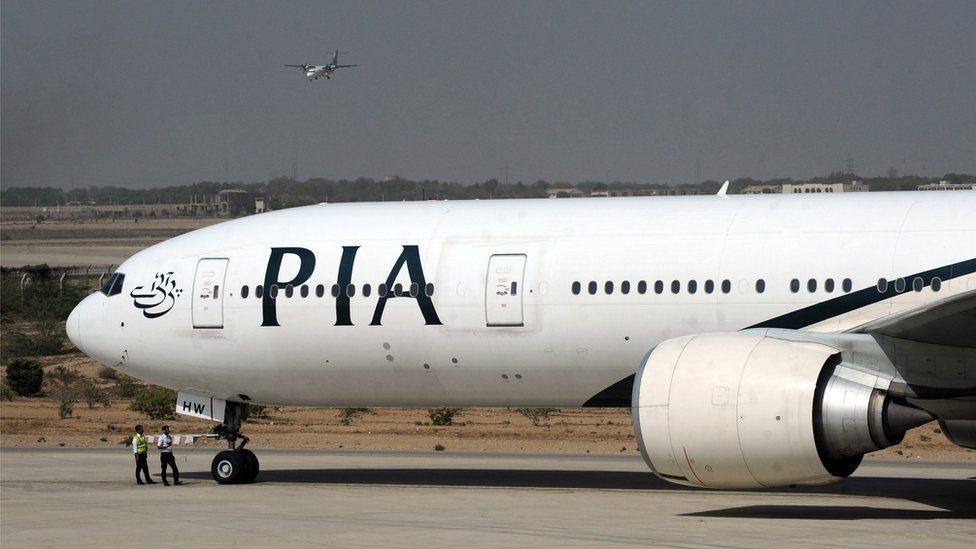Is heroin being smuggled on Pakistani planes into Heathrow?
- Published

Pakistan's national carrier says it is taking measures to ensure its planes are not used to carry drugs after heroin was found on two of its London-bound aircraft.
Aviation authorities are also investigating how the drugs might be making their way on to the planes of Pakistan International Airlines (PIA).
What happened?
On 15 May, UK's Border Force officials impounded a PIA flight from Islamabad on arrival at London Heathrow airport and searched it for several hours.
The National Crime Agency later said that a quantity of heroin had been found hidden in different panels of the plane.
There were suggestions that the British authorities had acted on a tip-off from Pakistan.
No-one was charged. The pilot was allowed to return to Pakistan the next day, while the crew members were given their passports back a day later.
The episode caused considerable embarrassment to PIA, which was already reeling from a plane crash in that killed dozens of people in December and a number of near-misses subsequently, sparking allegations of corruption and mismanagement.
Then on 22 May, Pakistani officials at Islamabad airport seized more than 20kg (44lb) of heroin from another aircraft headed to Heathrow.
An investigation is continuing.
What is Pakistan doing about it?
Investigations were launched to identify suspects within the PIA and the Civil Aviation Authority (CAA) with possible links to a drug trafficking ring that may have been using PIA to smuggle the drug abroad, Mashhood Tajwar, a PIA spokesman, told the BBC.
The investigation is being conducted by a team of officials from airport security, customs and the anti-narcotics force (ANF).
Mr Tajwar said pre-flight searches of aircrafts had been a part of standard operating procedures in the past, but surveillance had been stepped up since the May incident at Heathrow.
On Friday, a high-level meeting presided by the prime minister's adviser on aviation, Mehtab Ahmad Khan, finalised new security measures and a Central Operational Committee headed by the CAA chief was constituted to oversee their implementation.
On Monday, four aircraft expected to fly to foreign destinations were scheduled for checking, one of which - as mentioned above - was carrying drugs.
How surprising is this?
This is not the first time drugs have been found on PIA planes.
Last December, 17kg (37lb) of heroin was seized by officials at Karachi airport from a plane being readied for a flight to Jeddah, in Saudi Arabia. The flight was delayed for over 11 hours as a result.
Pre-flight checks are part of routine procedure and sniffer dogs are regularly used to clear aircraft for operations, PIA officials say.
But the presence of heroin on some aircraft shows that officials responsible for such checks may either have been complacent or linked to drug mules among employees.
While poppy crops across Pakistan have largely been eliminated, it is still grown in large parts of southern Afghanistan where insurgent groups wield influence and officials have little power.
Analysts say poppy and heroin are among the main sources of income for these groups.
And since some of them are said to have the tacit support of Pakistani authorities, they are said to be able to enter the country and smuggle heroin into Pakistan for onward shipment to the West.
Such smuggling is further helped by large-scale movement of Afghan refugees across the Pakistan-Afghanistan border, experts say.
How damaging is this for PIA?
Pakistan International Airlines has also courted controversy recently for other reasons.
In February its management was accused of trying to cover up an air safety breach when it boarded seven extra passengers on a flight from Karachi to Medina, Saudi Arabia. They were allowed to stand in the aisle during the flight.
In April, a passengers photographed the chief pilot of a London-bound flight taking a nap in the passenger compartment, leaving the controls in the hands of a first officer and a trainee pilot.
The pilot denied he had breached safety rules, but the PIA management said they were investigating the incident.
In early May, another pilot on a flight from Tokyo was accused of allowing an unauthorised foreign national into the cockpit. The passenger, a Chinese woman, remained there for two hours during the Tokyo-Beijing leg of the flight.
The incident was filmed by a journalist who was traveling on the same flight.
In 2013 a PIA pilot who admitted being over the legal alcohol limit to fly after being arrested in the cockpit was jailed for nine months in the UK.
- Published10 March 2017
- Published16 May 2017
- Published7 March 2014